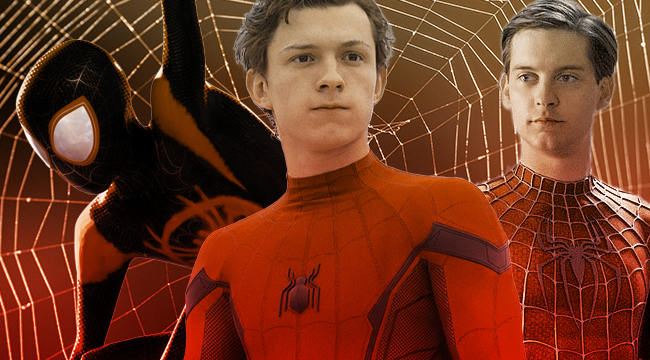
With the release of the latest Spider-Man movie upon us, we thought it made sense to go back, re-watch, and marinate on what these films have meant to comic book movie culture over nearly two decades before ranking them from worst to best. We pored over everything — from the iconic upside-down kiss to Spider-Pig, sinister villains, ill-advised bouts of street dancing, awkward high school moments, astonishing acrobatics, life lessons, quips, and thwips — to do this exploration into the expansive spiderverse.
8. Spider-Man 3 (Amazon)
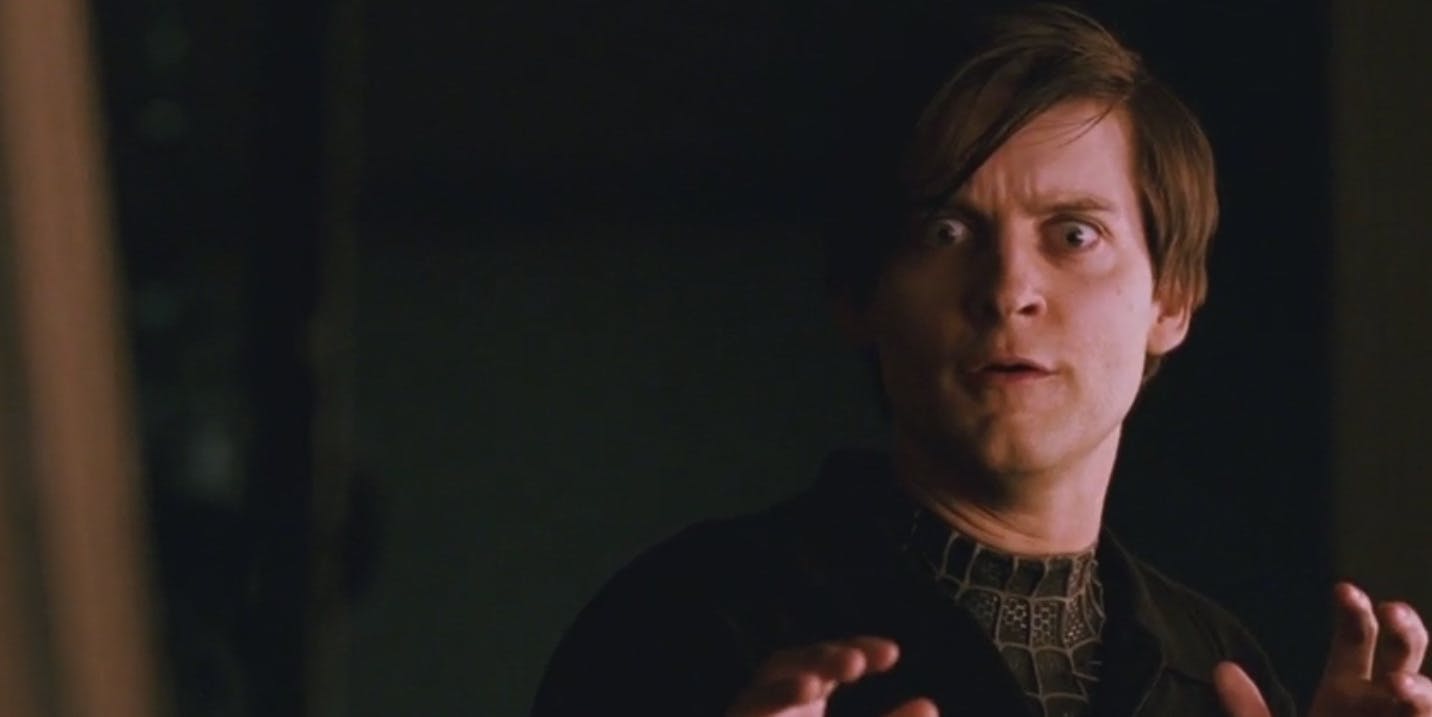
There’s a certain stink of failure attached to this film owing, in part, to nice guy Peter Parker’s oft-mocked transformation into a hip-thrusting mega-douche after coming into contact with a space symbiote. That and this being the end of this particular series. But it wasn’t like Sam Raimi and company were cast out in disgrace. Spider-Man 3 actually had killer box office (better than Homecoming) and a not-horrific critical reception (though, audience numbers are split down the middle). The prospect of another film in the series was very real until a few years later when Raimi and Sony couldn’t land on the right idea, and the studio decided to do a reboot instead. So, Spider-Man 3 may not be the complete trainwreck that you remember. At least not in the traditional sense. It is, however, afflicted with a sense of largesse that undermines its established characters. Something Raimi basically acknowledged when he was on the Nerdist podcast in 2015:
I think [raising the stakes after Spider-Man 2] was the thinking going into it, and I think that’s what doomed us. I should’ve just stuck with the characters and the relationships and progressed them to the next step and not tried to top the bar.
The villains also fail to stand out. Venom (the aforementioned symbiote) is wasted, Sand-Man is utterly forgettable, and Harry’s transition to the Green Goblin is undermined by a weirdly delayed update from his butler that undoes a film and a half’s worth of Spidey-hate, setting up an obvious hero’s death. All in all, this very much feels like the third film in a series. But it also feels like the loosest presentation of these characters by this group, meaning Raimi and company weren’t taking themselves too seriously. That didn’t translate to glory in this film, but it’s enough to make you sort of wonder what Spider-Man 4 could have been.
7. Amazing Spider-Man 2 (Amazon)
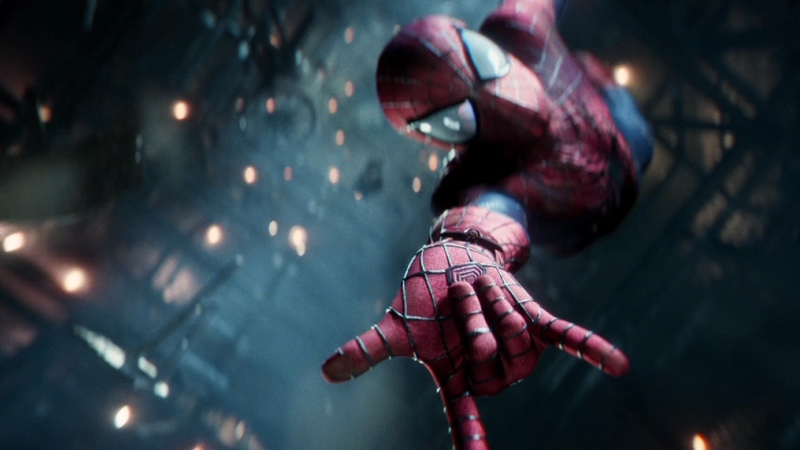
The final film from the first Spider-Man reboot suffers from some of the same problems as the final film from the original trilogy with, perhaps, too much going on. Peter’s dive into the mystery of his parent’s disappearance is understandable and a departure from the past series, but it’s ultimately unexciting. Also, there’s the absence of a compelling and challenging villain.
As sadsack Max Dillon, Jamie Foxx seems locked in an impression of Jim Carrey’s obsessed Edward Nigma character from Batman Forever. As Electro, his motivation, at least as it pertains to Spider-Man, is weak, giving us an (impressive) light show with no real point. Dane DeHaan has the unenviable task of breathing life into a character, in Harry Osborne/The Green Goblin, that Raimi had exhausted a few years prior. And with that role he does … eh, not much. The motivation is amped up as he fights a genetic death sentence and the after effects from a last-ditch effort to mutate his sick away are more intense than Norman or Harry Osborne’s were when they took on the mantle, but his real impact comes from what he takes from Peter in the midst of an epic aerial fight at a power plant.
Emma Stone’s portrayal of Gwen Stacy doesn’t get enough credit, specifically in the second film. The chemistry with Andrew Garfield is off the charts (unsurprising, considering their off-camera relationship), and her resistance to the idea that her father or Peter can shield her or define her path stands out. Her death (fated by the laws of comic bookdom but a fridging all the same) would have seriously hampered the series had it gone forward. Which had been the plan despite middling box office and waning enthusiasm prior to the Marvel/Sony deal. Unlike Spider-Man 4, there aren’t too many people mourning the loss of what might have been with an Amazing Spider-Man 3.
6. The Amazing Spider-Man (Amazon)

The Curt Conners/Lizard story taps the same keys as the Doc Ock storyline in Spider-Man 2, which is tiresome, but it does the job of putting everyone in peril, sparking Spider-Man to swing into action. This is a fine film that would have placed a little higher if I was talking solely about onscreen product. As Peter Parker and Spider-Man, Andrew Garfield brings electricity and a type of brash New York swagger that was missing from Tobey Maguire’s generalized take. He’s also funny and more convincingly young, impulsive, and rebellious in a film that feels a little darker and a little more grounded than the series that preceded it. The Tom Holland reboot will get all the praise (and some of that is coming up later in this article), but director Marc Webb deserves credit for finding a new kind of energy while refreshing a mostly beloved franchise.
5. Spider-Man (Amazon)
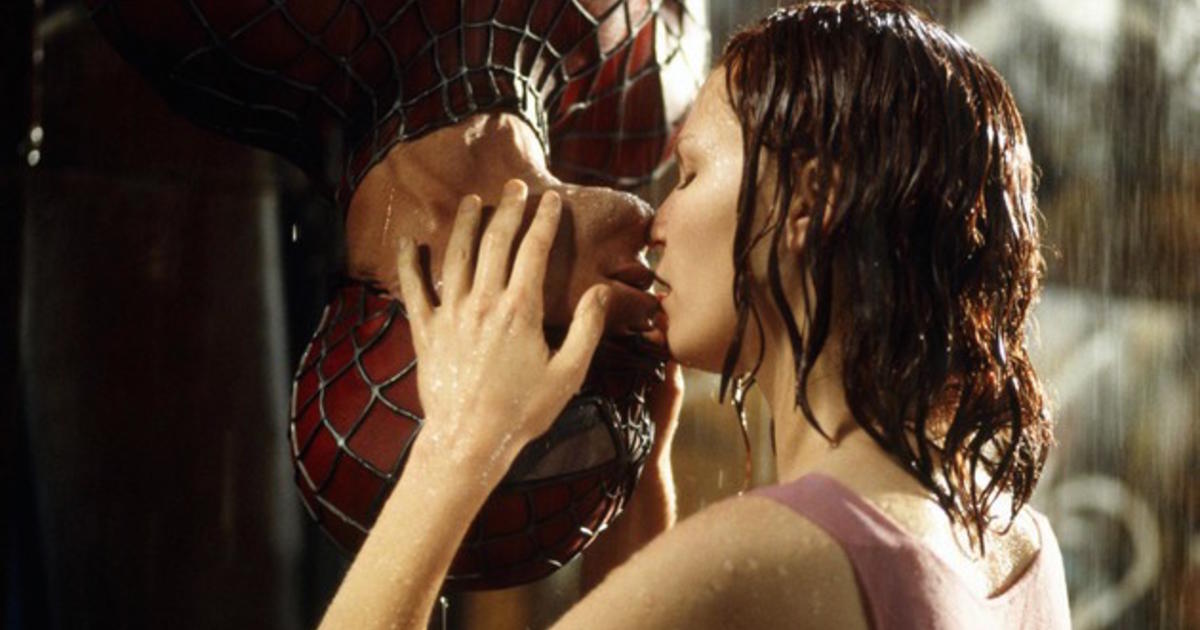
On its own merits and divorced from its moment in time (allowing it to be compared to flashier, depthier, and more recent competition), this is a mid-level comic book movie with a somewhat boring version of Peter Parker at its center. Willem Dafoe chews scenery as an occasionally wild-eyed Norman Osborne, James Franco looks bored as his son, Harry, and New York is full of sunshine and devoid of gritty charm. (Though, after the attacks of 9/11, maybe that’s the New York audiences needed most?)
Without an all-heart performance by Kirsten Dunst (who brings dimension to the role of Peter’s eventual love interest, Mary Jane) and that iconic upside-down kiss, I doubt Sam Raimi’s film would be as easily remembered as it is. Though, the visuals also help. It’s easy to imagine the sight of Spider-Man swinging from building to building meaning as much to some people as the sight of Christopher Reeve taking flight in Superman means to others. We’d never seen that before and that kind of awed first reaction freezes the film in nostalgic amber, making it somewhat impervious to re-inspection and criticism.
Spider-Man also deserves credit for its role as a bridge between eras. By the late ’90s, a micro goldrush of uninspiring and utterly forgettable comic book adaptations and the Batman franchise had run out of road owing to a lack of substance, specialness, and faith in the audience to embrace more than a surface spectacle. Eventually, the Nolan Batman films and the MCU would come in and show a willingness to load up escapist and eye-popping fantasies with complex and meaningful narratives, humor, and humanity. Blade, the X-Men films, and the Spider-Man films — all released in the space between — don’t quite belong in the same zip code, but they’re much closer to that era than they are to The Shadow, Batman And Robin, and Steel.
4. Spider-Man 2 (Amazon)
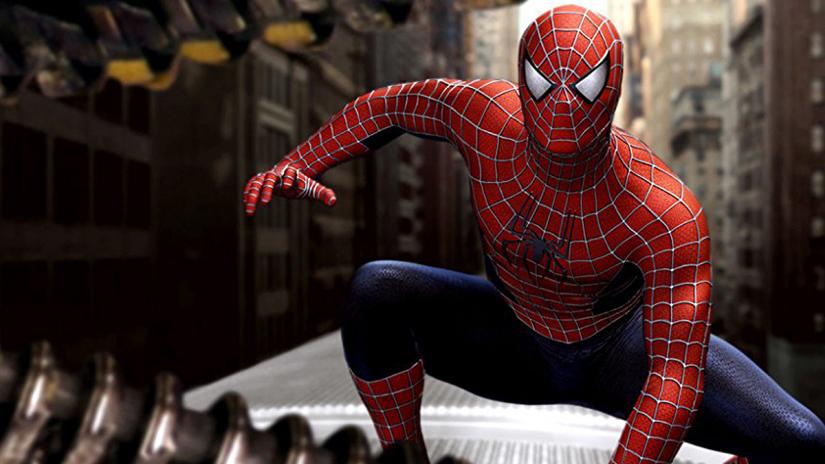
Freed from the burden of an origin story, Raimi focuses his lens on the ins and outs of Peter Parker’s life split between being a superhero, a freelance photographer, and a college kid — which is charmingly relatable in the sense of what it’s like being young and overstuffed with obligations and desires, but not time. There are also multiple villains. As Doctor Otto Octavius, Alfred Molina seems like a good hang, but soon, Octavius becomes a disgraced and deformed former man of science on the hunt for Spider-Man and a quest for redemption of a kind after an experiment with fusion goes way wrong, killing his beloved wife and giving a set of attached tentacles a say in his actions. Credit to Molina for resisting the impulse to go over the top here.
The revenge storyline with Harry determined to kill Spider-Man for the assumed killing of his father is also a highlight (Franco plays obsessed better than he plays the affable best friend) and comes across as interesting if for no other reason than because it adds another complication to Parker’s unraveling life. Ditto his relationship with Mary Jane, who is kept at an arm’s length until the end when, once again, Dunst’s prowess elevates the film, betraying her vocal support for Peter’s continuing friendly neighborhood Spider-Man adventures with a quick look of trepidation as he swings toward danger. I can’t say enough about the power of that relationship across the three Raimi films. It’s still unmatched in comic book film canon.
If the first film was too tepid and the third was just… too… much… then this completes the porridge analogy nicely by injecting chaos and angst into Peter Parker’s life in a way that’s just right.
3. Spider-Man: Homecoming (Amazon)

By now, you can tell that I prefer Andrew Garfield’s Spidey to Tobey Maguire’s, but both, unfortunately, lack the authenticity of a Tom Holland, who is so convincing playing awkward and over-his-head while trying to navigate high school. Just 19 when he was cast to play beside the biggest stars in the world in the biggest franchise of all-time, Holland likely wasn’t at a loss when in search for inspiration. Contrast that to Maguire and Garfield, who were (obviously) in their late 20s playing high school students when they debuted. Holland’s authenticity is about more than the performance, though, it ties so nicely to the ethos of what Jon Watts and Marvel are trying to do with Spider-Man across multiple movies.
Raimi and Webb were quick to push Spidey into adulthood, muddying his adventures with the pulls of adult relationships, financial burdens, and the existential angst that afflicts you when you’re in your 20s and out in the world. This time around, Peter is allowed to be free and young and a little innocent. At least, for now. Sure, there are conflicts and people that he loves who are put in peril, but the whole thing feels just a little more unique considering the field.
Holland’s youthful exuberance as Spider-Man isn’t the only reason this film ranks this high. For one, it wisely eschews the origin story, assuming that people know about the whole great power/great responsibility thing. It also surrounds Peter Parker with a believable crew of peers, adds personality to the Aunt May role with Marisa Tomei on hand to make things happen without the ball in her hands, and, most importantly, it allows Robert Downey Jr’s Tony Stark to play. For all the shades of Tony Stark that we’ve seen across the constellation of MCU films, this is his most… unexpected? But imagine believing Tony as a father in Endgame without him serving as an active and stern mentor for Peter Parker in Homecoming. Now imagine the end of Infinity War without that strong connection. I don’t always love the idea of massively connected universes, but it’s pretty damn impressive when they run a thread up, down, and through these films for a big payoff.
2. Spider-Man: Far From Home (In Theaters)
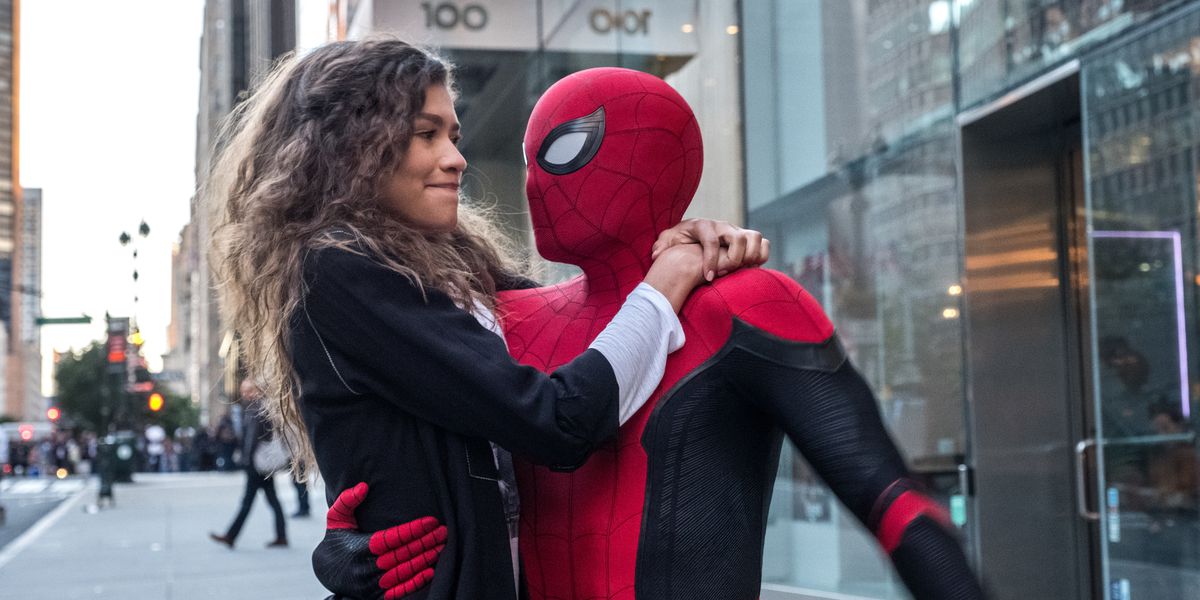
Being the first MCU film out of the gate following the universe altering events of Avengers: Endgame could have been a curse but Jon Watts treats it as a blessing, blowing out the idea of Peter Parker being pulled between two worlds (his life as a teenager and his responsibilities as an Avenger) and setting it on an international stage with his friends in peril. Kudos to Watts for also finding a clever way to touch on loss and hero worship within a twisty story that feels, at once, centered in the now of the real world, in-line with MCU history, and like something that isn’t totally dwarfed by comparisons to Endgame. It’ll handle comparisons to Homecoming quite well, as well. This feels bigger, it’s more fun, and the stakes are decidedly amped up. The performances also take a step forward, which is saying something considering the level that Homecoming operated at.
Holland is, yet again, excellent as Peter Parker and Spider-Man while growing into his role as one of the pillars of the MCU. It’s clearer than ever that he’s a superstar talent, pulling us in closer to Peter Parker’s world as he scrambles, resists, but ultimately finds his way by the skin of his teeth. At this point, Parker may be the MCU’s most compelling character. Make no mistake, though, Zendaya absolutely steals this film as MJ, adding an emotional dimension that was, perhaps, missing in Homecoming while the character was kept somewhat at a distance. The potential exists for the Zendaya/Holland pairing to be as iconic as the Dunst/Maguire duo.
The end of something and the start of something else, Far From Home leaves a ton of questions in its wake. But it also sets a foundation for Peter Parker in terms of his battle readiness and confidence, making the wait for the next Spider-Man nothing short of excruciating.
1. Spider-Man: Into The Spiderverse (Netflix)
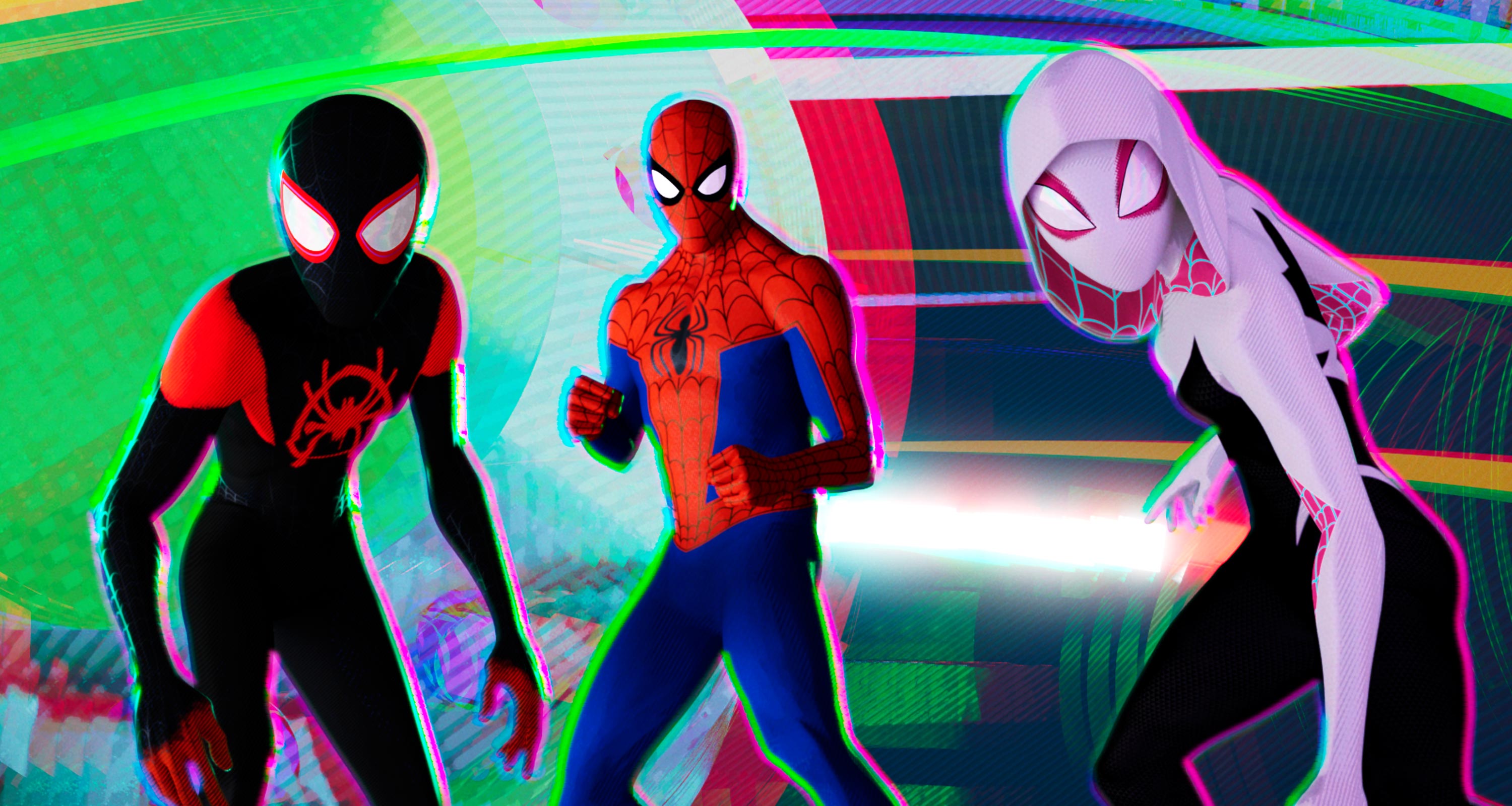
It’s a comic book brought to life. A film that feels like it was made as an invitation into a world of bright colors, captivating storytelling, and the history of the spiderverse. I mentioned, before, those moments like seeing Tobey Maguire web sling for the first time or Christopher Reeves take flight. The reveal of the Batmobile or The Avengers looking up toward their first big test as a supergroup. Imagine seeing this film for the first time after never really feeling comic book movies. Even if that’s not your experience with this, you’ve had that experience where your jaw sorta dropped and you sorta got it for the first time. We all have, so it adds to the appreciation of something that is making that happen for others.
Spider-Man: Into The Spiderverse is more than just that, though. It’s an excellent origin story that has some familiar rhythms while still feeling fresh due to the focus on Miles Morales. And then everything rolls into a smash introduction to the multiverse and a gaggle of Spidey-heroes and, of course, the tried and true story of a hero finding their heart/bravery/whatever. But not just for Miles. Credit amazing voice casting, which allows Miles’ story (Shameik Moore) and the stories of a very different kind of Peter Parker (Jake Johnson) and Doc Ock (Kathryn Hahn), as well as very unique heroes like Spider-Pig (John Mulaney), Spider-Man Noir (Nic Cage), and Gwen Stacy (Hailee Steinfeld) to pop. But I keep returning to the color, art, sound, and motion that allows this film to stand out in moments as disparate as Miles battling Kingpin to walking to school and being chased through a city street. All of it is so awake. All of it feels as though every scene sparked from the idea of, “how do we inject an element of specialness into this?”
Into The Spiderverse feels like a culmination of everything every one of these films has tried to do with Spider-Man, and then it topples the assumed limits (owing to the free-range canvas that animation provides) and injects an energy and ambition all its own.
